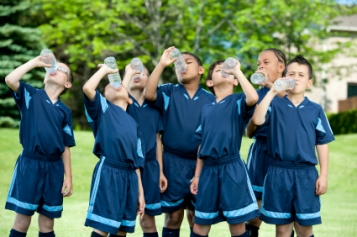Today's sports moms do much more than juggle schedules and drive athletes to and from games (though six out of ten shuttle their kids to sports practices and games three or more times a week). Many also serve as coaches, assistant coaches, and team moms, or volunteer to bring snacks and drinks.

Regardless of her role, one of the most important things a mom can do to help every athlete on the team perform at their best is to ensure that they are well-hydrated, before, during and after practices and games.
Here's how:
- Hand out hydration tip sheets at the pre-season meeting: Before the season starts, educate athletes, coaches and parents about the importance of hydration and how even mild dehydration (a loss through sweat of as little as 2 percent of body weight, or less than 2.5 pounds in a 110-pound athlete) can hurt performance.
- Remind players to hydrate during warm-ups: Studies show many youth athletes begin sports already dehydrated, so assign a team mom or assistant coach the job of reminding players to hydrate during warm-ups by drinking 4 to 8 ounces of cold water or a sports drink about 15 to 20 minutes before the game starts.
- Develop a hydration game plan tailored to the sport: Some sports such as baseball, basketball, football, ice hockey, and track and field have frequent breaks during which athletes should be reminded to consume small volumes of fluids (a big gulp or two) based on how much they are sweating and the weather conditions. For other sports, like soccer, lacrosse, cross-country, that are continuous, athletes should be reminded to consume fluids to maximize hydration within the sport's confines and rules, such as after goals, during injury time-outs, end of periods, or at half-time.
- Hydration reminders keep athletes in the game: Studies of children and teenagers have shown that thirst is not a reliable indicator of hydration status. Although the precise reason is unclear, experts speculate that it is likely due to the fact that children and teens playing sports get distracted by the enjoyment of the sport. To keep players hydrated, a team mom or assistant coach or designated volunteer should remind athletes to hydrate about every 20 minutes, even if they aren't thirsty. For high intensity sports like hockey, soccer, lacrosse and football, studies show that a sports drink with electrolytes and less than 7% carbohydrates help athletes maintain peak performance right to the end of the game and avoid early fatigue, heat cramps, light-headedness, and heat exhaustion that can take them out of the game.
- Know the signs of dehydration and heat illness: Assign a volunteer mom, team mom or assistant coach to be on the lookout for signs of dehydration or impending heat illness, especially in hot, humid conditions. Consider cancelling or modifying practices if the heat index (a measure of apparent temperature based on the air temperature and relative humidity) is over 104.
- Help kids recover and refuel after sports: Remind players to rehydrate after a game, especially if you are at a tournament, swim or wrestling meet where multiple games/races/contests are held over the course of a day or weekend. Assign the team mom, assistant coach or volunteer parent to distribute recovery drinks containing protein and carbohydrates (such as chocolate milk or a commercially-available sports recovery drink). Not only do such drinks help athletes replace the fluids lost during sports, but the protein helps the body recover from exercise by enhancing muscle repair, and the carbohydrate replenish glygogen stores in muscles, which provide a source of fuel for the next game. Also make sure athletes should drink enough fluids to replace the weight lost from sweat and through urination. A good rule of thumb is to drink 20-24 ounces of a sports drink for every pound (16 ounces) of weight lost.
Brooke de Lench is the author of Home Team Advantage: The Critical Role of Mothers in Youth Sports (HarperCollins), Founder and Publisher of MomsTEAM.com, and producer and director of the new high school football concussion documentary, "The Smartest Team," which will be broadcast this fall on PBS stations across the country.
Posted July 22, 2013








